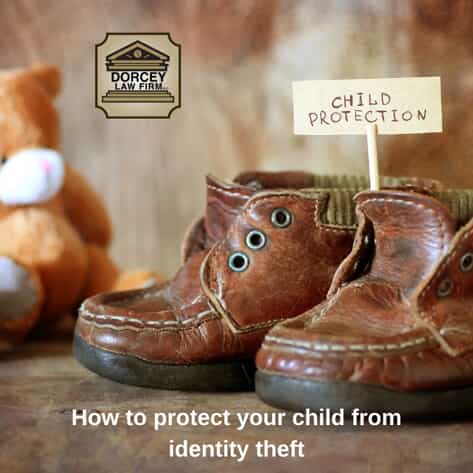In 2017, over a million children were affected by identity fraud. Families paid over $540 million in out-of-pocket costs towards a total of $2.6 billion in losses.
While parents already have plenty to worry about, there are easy, proactive steps they can take to protect their children from identity theft.
The key to preventing any kind of identity theft — yours or your child’s — is to be proactive, not reactive. Taking the time now to protect your child’s identity can save you a big headache in the long run and provide them with the foundation for financial success.
 Thankfully, there are many ways for parents to protect their child’s identity against fraudsters. Below, CNBC Select spoke to Liz Lasher, VP of fraud and financial crimes at FICO, about the best actions parents can take to protect their child from a stolen identity.
Thankfully, there are many ways for parents to protect their child’s identity against fraudsters. Below, CNBC Select spoke to Liz Lasher, VP of fraud and financial crimes at FICO, about the best actions parents can take to protect their child from a stolen identity.
How to protect your child from identity theft
- Freeze your child’s credit.
- Monitor both of your credit reports.
- Check social media privacy settings.
- Keep your eye out for unexpected mail in your child’s name.
- Freeze your child’s credit
A credit freeze restricts access to your credit report, which helps safeguard against fraudsters opening unauthorized accounts in your name. You should have a credit freeze in place for yourself at all times, except when you’re applying for new credit. And if your child is under 18, their credit reports should be frozen as soon as possible.
“Freeze your children’s credit if they are young, as they won’t need it for many years,” Lasher says.
You’ll need to initiate credit freezes with all three credit bureaus (Experian, Equifax and TransUnion) to ensure your child’s credit reports are all frozen. While this process can normally be completed in under 10 minutes for adults, for children it is “time consuming, but worthwhile,” Lasher says.
“The three major credit bureaus in the U.S. currently do not offer an online portal to freeze your children’s credit, even if they have them to freeze your own credit,” Lasher says.
So you’ll need to print out forms with each bureau, fill them out, provide copies of required documentation, such as your driver’s license and your child’s birth certificate, and mail the completed forms and documents to each bureau.
Here are the links to freeze your child’s credit with each bureau:
“You will receive a confirmation letter in the mail, which you should store in your safe so that you have the documentation to unfreeze credit when it is time,” Lasher explains.
Once your child meets authorized user age requirements, you can add them to your credit card account. This allows them to piggyback off your credit and establish a credit score, even while their credit is frozen.
- Monitor both of your credit reports
“Monitor your credit report on an annual basis, and teach your kids (if they are old enough) how to do it too,” Lasher says. It’s also a good idea to check your child’s credit report to verify that the credit freeze took effect and periodically check it wasn’t removed.
You can monitor credit reports annually for free at annualcreditreport.com, which is authorized by federal law and provides a free copy of your credit report every 12 months from each credit bureau.
“You can also go to the bureaus — starting in 2020, everyone in the U.S. can get six free credit reports per year through 2026,” Lasher says. And if you want more comprehensive credit monitoring programs, companies like FICO offer paid services, that include credit scores, $1 million identity theft insurance and credit scores for mortgages, auto loans and more.
When you monitor your credit report, Lasher points out that you should look for any activity that is unexpected or out of the ordinary. That may be a new account, missed payment history or a new address.
If you find information that is incorrect, dispute it with the credit bureaus.
Learn more: What is credit monitoring and does it protect you from fraud?
- Check social media privacy settings
Social media can be seen as a gold mine of information for fraudsters. They can potentially access your name, birthdate, location and other personal information that can make it easy for them to forge an account in your child’s name.
Lasher recommends parents check their social media privacy settings for both their accounts and their child’s accounts, if they have them.
“Set a family policy around what should and should not be shared, and be sure to have a conversation with grandparents as well,” Lasher says. ”‘Grandsharenting’ is a thing, and has been contributing to the child identity theft problem.”
If you’re new to the term “grandsharenting,” it’s when grandparents overshare photos of their grandkids on social media. Whether it’s through posting pictures on Instagram or Facebook, this can lead to privacy concerns and identity theft. The risk gets greater if those photos are tagged with a location or display personal information, such as a birthday.
- Keep your eye out for unexpected mail in your child’s name
While you may have opted into paperless mail for financial products and bills, you may still receive the occasional targeted offer in the mail for opening a new credit account. This may not be surprising if you have an existing relationship with the marketer, but you should raise an eyebrow if your child gets similar mail.
“Keep your eye out for unexpected mail in your child’s name,” Lasher warns. “They probably shouldn’t be getting offers for vehicle financing or credit cards, and that would be a bad sign.”
Lasher also recommends signing up for the USPS Informed Delivery Program. With this free program, you can digitally preview your mail and manage any packages scheduled to arrive soon.
Learn more:
- Who’s responsible for your kids’ unauthorized credit card charges?
- At what age should you start teaching your child about credit?
- 8 tips for parents to help their children build good credit early
- The 8 best credit cards for new parents, helping you pay for everything from diapers to a college fund
- Best credit cards for families
https://www.cnbc.com/select/how-to-protect-child-from-identity-theft/
It is our goal to provide our clients with the highest level of legal services in the areas of Last Will and Testaments, Living Trust, Irrevocable Trusts, Estate Planning, Probate, Asset Protection, and complete Business Planning. If you or someone you know needs information on Florida estate planning, please contact us today at 239-449-8191 to schedule your free consultation.
